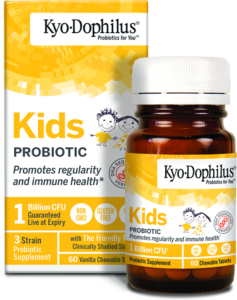When we think about gut health around this time of year, bolstering our children’s immune systems to beat the coming cold and flu season might come to mind. But as science makes greater strides, we’re beginning to learn even more about how integral gut health is for multiple facets of wellbeing, especially in growing kids.
The gut is home to 10 times more microbial cells than the rest of the human body; that figure represents around 1,000 trillion microbes, 5,000 different species, and a staggering 70 percent of our entire immune system. With its connection to diet and lifestyle, the gut also plays a key role in digestive health, helping with nutrient absorption and our body’s ability to break down foods like complex carbohydrates, fiber, and protein.
The Impacts of Childhood Gut Health
If we looked under a microscope, we’d find that no two guts are exactly the same—but there are some commonalities associated with better health outcomes. Studies have shown, for instance, that centenarians tend to have more diverse gut microbiomes compared to the average person, suggesting a link between microbial diversity and longevity. But this health link begins even earlier in life; it could even be said that we share a birthday with our gut microbiome. From the moment a fetus leaves the insular security of the womb, the makeup of the microbiome begins taking shape as it’s exposed to a whole new world of unique environments and bacteria.
One 2022 study showed a fascinating link between day care attendance and greater microbiome maturity and immunity, as these children were exposed to more diverse bacteria (and viruses) than those in home care settings. In studies of childhood dysbiosis, it’s also been found that an abundance of essential bacterial strains, including Lactobacillus, is associated with better digestive health. Let’s take a look at some lesser-known facets of health that can be supported with a happy and balanced microbiome:
Childhood Growth
The gut microbiome is crucial for regulating how the body harvests energy from nutrients, growth hormone signaling, and preventing pathogen colonization. Disruptions in gut microbiota development, especially in the first two years of life, can impact growth trajectories, including weight and height.
Oral Health
The health of our gut microbiome can help prevent an overgrowth of harmful oral bacteria that cause dental plaque, cavities, and gum disease. Children are especially susceptible to cavities, and in addition to good oral hygiene, a healthy gut and immune response sets them up for better success in staving off chronic inflammation and infections. Some dental experts even recommend eating more gut-supportive foods to support oral health.
Vaccine Efficacy
Vaccines use antigens to teach children’s developing immune systems how to recognize and fight off potentially dangerous diseases. While multiple factors can influence how well they work, a growing body of evidence suggests that gut health plays a key role in the immune system’s responsiveness to vaccines.
Sleep & Mood Regulation
When kids feel good in their bodies, better sleep and mood will follow. Gut bacteria like Bifidobacterium have been linked to longer sleep duration (and less night-time awakenings) in young children, and harnessing diet to influence the great gut-brain connection is well-documented in the management of childhood disorders related to mood and behavioral issues as well.
Gut-Supportive Health Habits
There are many ways we can tap into these wonderful benefits (and more) to support our child’s gut microbiome. A few habits you may wish to adopt as a family include eating a more diverse diet that’s rich in dietary fiber (prebiotics) and probiotic “superfoods,” avoiding ultra-processed and sugary foods to discourage the growth of bad bacteria, and only turning to antibiotics when necessary to protect important gut diversity.
A Gut-Health Supplement Superstar
Diet is undeniably one of the best ways to move the needle on gut health—but everyday life and kids with picky palettes can also make it one of the most difficult habits to stick to! While nothing can replace a well-balanced dinner plate, daily supplementation can help fill in some of those inevitable nutritional gaps to ensure kids get more of the “good stuff” as building blocks for a more robust gut microbiome and immune system.
Send your child back to school this season with a supplement made with their wellness in mind: Kyo-Dophilus Kids Probiotic
Formulated with 1 billion CFU of The Friendly Trio–featuring probiotic strains Lactobacillus gasseri, Bifidobacterium bifidum, and Bifidobacterium longum for childhood digestion and immune support–this single chewable tablet can easily be crushed and mixed with food or juice. It’s also gluten-, soy-, milk-, and sodium-free, with no artificial colors or flavors.
With a few new health habits and natural solutions at your fingertips, even hectic back-to-school days don’t have to get in the way of supporting your child’s wonderful microbiome and setting them on a path towards better lifelong health.
This article was written in partnership with EcoParent Magazine. Head over to their site for a wealth of health resources and eco-friendly tips for you and your family.
This article is for informational purposes only. This article is not, nor is it intended to be, a substitute for professional medical advice, diagnosis, or treatment and should never be relied upon for specific medical advice.


Share this Post